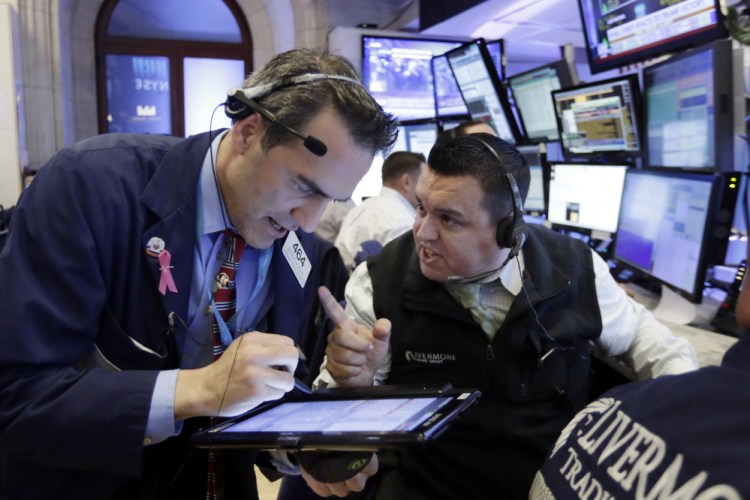Major U.S. stock indexes moved higher in afternoon trading Wednesday as Wall Street sized up the implications of Donald Trump’s stunning presidential election victory.
The solid gains marked a reversal from earlier in the day, when global stock markets were roiled after it became clear that Trump had sealed the win over Hillary Clinton.
Markets had been jittery in recent weeks over the prospect of a Trump administration. But conciliatory comments from the president-elect helped global stock markets recover a large chunk of their earlier losses.
On Wall Street, financial companies led the gainers, surging 3.2 percent. Banks and other financial stocks tend to benefit from higher interest rates and less government regulation, two things investors anticipate could happen during a Trump presidency.
Health care stocks were also heading sharply higher. Traders had feared Clinton would implement curbs on drug pricing increases that could hurt drugmakers and biotechnology companies.
Utilities were down the most, sliding 2.6 percent, followed closely by consumer-focused stocks. Crude oil prices headed higher after being down earlier in the day.
The Dow Jones industrial average was up 171 points, or 0.9 percent, to 18,504 as of 1:05 p.m. Eastern Time. The Standard & Poor’s 500 index gained 17 points, or 0.8 percent, to 2,157. The Nasdaq composite index rose 38 points, or 0.7 percent, to 5,232.
A sell-off in bonds sent prices tumbling, driving the yield on the 10-year Treasury note up to 2.04 percent from 1.86 percent late Tuesday, a large move. That’s the highest the rate has been since January. That rate is a benchmark used to set interest rates on many kinds of loans including home mortgages.
Traders are selling bonds to hedge against the possibility that interest rates, which have been ultra-low for years, could rise steadily again under a Trump administration, said Tom di Galoma, managing director of trading at Seaport Global Securities.
“People are starting to believe that Donald Trump is good for the economy, which makes him not so good for the bond market,” di Galoma said. “You’ve also had the stock market come back overnight. People are starting to realize that a Trump presidency is not the end of the world.”
Though uncertainty remains over Trump’s trade, immigration and geopolitical policies and what his victory means for the future of globalization, investors appeared somewhat calmed by his victory speech, in which he praised Clinton and urged Americans to “come together as one united people” after a divisive campaign.
“While Trump slightly soothed some concerns in his victory speech, uncertainty remains over what kind of a U.S. he plans to lead,” said Craig Erlam, senior market analyst at OANDA.
Health care companies like hospital chains and some insurers that gained business from the Affordable Care Act’s coverage expansion took heavy losses. Meanwhile, shares jumped for drugmakers and pharmacy benefits managers that likely will face less regulatory scrutiny over price increases from a Trump administration.
HCA, the nation’s largest hospital chain, was down nearly 15 percent, while Viagra maker Pfizer climbed more than 7 percent, the biggest gain in the Dow. The biggest pharmacy benefits manager, Express Scripts Holding Co., was up more than 6 percent.
Traders also bid up shares in defense contractors, anticipating the companies will thrive under a Trump presidency. Northrop Grumman climbed 5.1 percent, while Lockheed Martin rose 5.7 percent. Raytheon added 7.1 percent.
Private prison operators also surged. Corrections Corp. of America vaulted 47 percent, while GEO Group jumped 20.1 percent.
Firearm sales typically surge when a presidential candidate who favors an expansion of gun-control laws is elected. That’s not the case with Trump, however. That gave investors a reason to sell shares in firearm makers. Smith & Wesson slid 14.4 percent, while Sturm, Ruger & Co.., fell 13.7 percent.
In Europe, Germany’s DAX was up 1.6 percent, while France’s CAC-40 gained 1.5 percent. The FTSE 100 index of leading British shares was 1 percent higher.
As Trump gained the lead in the electoral vote count, share prices tumbled in Asia, which were open during the election results.
By the time Trump was confirmed the winner and made his speech, financial markets had steadied. The dollar also recouped some ground, while assets that many investors search out at times of uncertainty, such as gold, came off earlier highs.
One currency that remained heavily sold is the Mexican peso. It was down 8.4 percent as the prospect of a wall along the United States’ southern border, a key campaigning point for Trump, has come one step closer to reality. Trump has insisted that Mexico will pay for the wall. The U.S. currency rose sharply to 19.75 Mexican pesos from 18.68 pesos.
Also potentially impacting the peso is Trump’s threat to rip up trade deals like the North American Free Trade Agreement, a key plank in Mexico’s economic strategy and growth.
“If Trump is able to follow through with these suggestions, Mexican activity will suffer greatly,” said Jane Foley, senior foreign exchange strategist at Rabobank International.
Trump doesn’t formally take the reins of power until January but he will begin the transition to his presidency almost immediately. In the coming weeks, investors will be looking to see if he further tempers some of the rhetoric that polarized American opinion and often spooked investors in financial markets.
Another point of interest will center on the U.S.’s trade relations with China and its impact across Asia. Trump’s victory has raised concerns that the U.S. and China might embark on a trade war of sorts and that protectionism around the world will grow.
Those concerns weighed heavily on Asian stocks. Japan’s Nikkei 225 index closed 5.4 percent lower, recouping some losses. Hong Kong’s Hang Seng closed 2.2 percent lower.
Associated Press writer Kelvin Chan in Hong Kong contributed to this report. Pylas contributed from London.
Send questions/comments to the editors.



Comments are no longer available on this story